A trial conducted in Ankara, in partnership with Turk Telekom, managed to hit 4.5 Gbps using commercial kit.
March 22, 2021

A trial conducted in Ankara, in partnership with Turk Telekom, managed to hit 4.5 Gbps using commercial kit.
The last time Nokia did a bit of 5G chest-beating it claimed 8 Gbps, but that was to two devices – i.e. 4 Gbps to each. Thankfully Nokia seems to have abandoned such attempts at crude number inflation and just focused on speed from one base station to one device, which should surely be the standard for such claims.
“Despite the launch of commercial 5G networks in many countries, 5G trials still play an important role in the development of faster and better networks,” said Tommi Uitto, President of Mobile Networks at Nokia. “This record speed achieved together with our long-term partner shows that we are constantly refining and improving how we build and manage 5G networks, and this is in no small part thanks to the nearly 200 5G trials, live operator networks and private wireless deployments we have delivered globally.”
“During the trial, we solely used mmWave spectrum over the 5G test network which reached record speeds above 4.5 Gbps,” said Yusuf Kıraç, Chief Technology Officer at Turk Telekom. “Thanks to this technology, which provides numerous benefits for users and operators, we achieved the high speeds and large capacity targets promised by 5G.
“These technologies also act as a bridge to develop and pave the way for “Terahertz” systems that provide ultra-high-speed and capacity, which are planned to be used in 6G. Being the most prepared operator in Turkey for 5G, thanks to our strong fiber infrastructure, we are delighted to conclude another important milestone in this technology with a record. We will continue to lead the development of all new generation technologies in our country, as we are doing today.”
The 5G speed record game is being mostly played by Nokia and Samsung. Nokia has focused on commercial environments, while Samsung still prefers the bigger numbers provided by lab tests. Because we therefore have to compare apples with oranges it’s impossible to tell whose kit offers higher speeds, so it’s all a bit of a waste of time. Still, it’s nice to see there’s apparently plenty of room for improvement at mmWave in those few environments that it’s useful.
About the Author(s)
You May Also Like








.png?width=300&auto=webp&quality=80&disable=upscale)


_1.jpg?width=300&auto=webp&quality=80&disable=upscale)


.png?width=800&auto=webp&quality=80&disable=upscale)